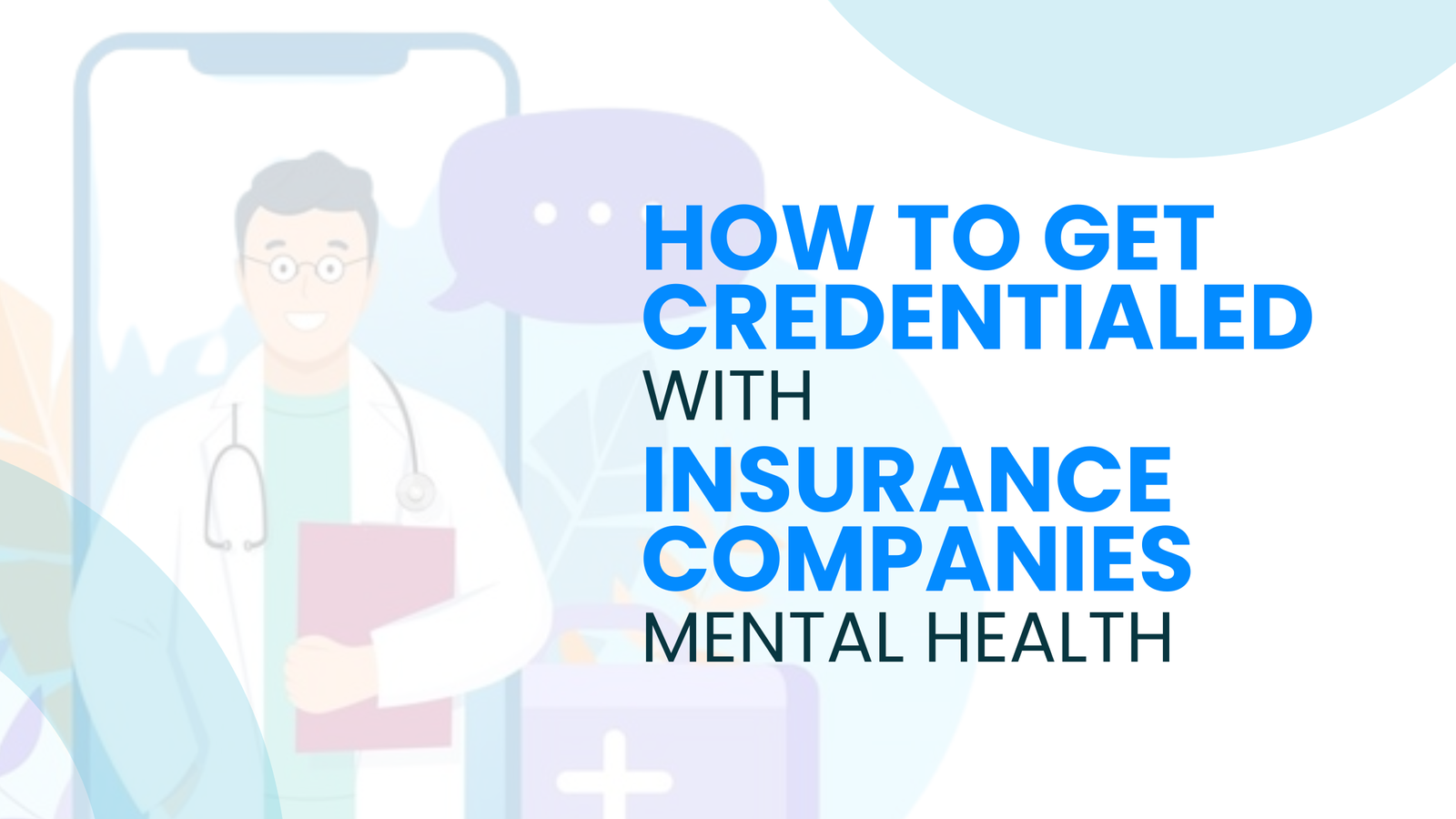Navigating the world of mental health insurance credentialing can seem daunting, but it’s an essential step for building a successful practice. To get credentialed with insurance companies, start by researching the different insurance panels available in your area, such as Aetna, Blue Cross Blue Shield, Cigna/Evernorth, and Medicare. Understanding which companies operate in your niche will help you decide where to focus your efforts.
Next, gather all the necessary documents, including your resume, licenses, and proof of education. Many insurance companies require therapists to submit this information through an online application process. Keeping your information updated quarterly is crucial to ensure seamless credentialing.
Once you have submitted your applications, follow up regularly to check on the status. This persistence shows your commitment and can often speed up the process. For more detailed steps, you can refer to this comprehensive guide on getting contracted with insurance companies.
Understanding the Process of Credentialing
To become a credentialed mental health provider with insurance companies, you need to understand several crucial aspects of the process. This includes what insurance credentialing is, why it is important for mental health professionals, and the specific requirements you will need to meet.
Defining Insurance Credentialing
Insurance credentialing is the formal process of verifying the qualifications of a mental health provider. This verification is done by insurance companies to ensure that you have the necessary education, training, and experience to offer your services. The process usually involves filling out detailed applications and submitting various documents. It is essential for gaining approval to bill insurance companies for your services, making it indispensable for practicing therapists.

Importance of Credentialing for Mental Health Professionals
Credentialing holds significant importance for mental health professionals. It allows you to join insurance panels and expand your client base by accepting insurance from new patients. As many clients prefer or can only afford services covered by insurance, being credentialed can greatly increase your potential client pool. Additionally, it boosts your professional credibility, showing clients that you meet the high standards required by insurance companies.
Credentialing Requirements
- Submit evidence of degrees and certifications
- Provide information on professional licenses
- Demonstrate relevant work experience
- Obtain malpractice insurance and provide the information
- Use the CAQH ProView to upload and maintain required documents. Learn about the CAQH Process
- Account for a credentialing timeline of a few weeks to several months
- Regularly check with the insurance company for progress updates to help expedite the process
Navigating the Credentialing Process
To successfully navigate the credentialing process, you’ll need to take several important steps. These include accurately completing applications, gathering the necessary documents, and tackling common challenges that may arise.
Step-by-Step Guide to Completing Applications
Completing applications is crucial in getting credentialed with insurance companies. Each insurance company has its own form, which you must fill out carefully. It’s important to provide accurate and complete information to avoid delays.
Start by gathering all necessary information about your practice, including your license number, education details, and professional experience. After submitting the application, you may need to follow up with the insurance company if you don’t receive a timely response.
Some insurance companies require you to complete the CAQH Proview, a standardized form used by many insurers. Keep this up to date as it streamlines future applications.
Documentation and Information Gathering
Gathering the required documents and information is a key part of how to get credentialed with insurance. You will need to assemble various documents such as your license, proof of malpractice insurance, education certificates, and work history.
Detailed and accurate records can make this process smoother. Make sure you have your resume and professional references ready. Having digital copies of these documents can save time and allow you to easily share them with multiple insurance companies.
Be prepared to dedicate time to this task. Credentialing can take between 90 to 150 days, so organization is key to avoiding unnecessary delays.
Dealing with Common Credentialing Challenges
One common challenge in LCSW insurance credentialing is incomplete or outdated information, which can delay your application. Double-checking your documents before submission helps.
Another issue can be the time-consuming nature of the process. It’s often necessary to follow up with the insurance company to check on the status of your application. Establish a system for tracking your submissions and follow-ups.
Sometimes, miscommunications occur between you and the insurance company. Keeping a record of your communications can help resolve any misunderstandings quickly and efficiently. Remember, persistence is key in overcoming these hurdles.
After Credentialing: Maintaining Your Status
Once you are credentialed with insurance companies, maintaining your status requires regular updates, meeting deadlines, ongoing education, and staying informed about policy changes. This helps ensure that you remain eligible to provide services and receive reimbursements.

Continuing Education and Training
Mental health professionals need to engage in continuing education (CE) and training. Most insurance companies require providers to complete a certain number of CE hours annually. These hours keep you updated with the latest practices and techniques.
Stay active in professional organizations and attend workshops. This not only fulfills CE requirements but also helps improve your skills. Failing to complete CE requirements can jeopardize your credentialed status, leading to interruptions in your ability to serve clients.
Renewal Procedures and Timelines
Renew your credentials according to the timelines set by each insurance company. Renewal processes can vary, typically requiring documentation of your CE hours, licenses, and other credentials.
Mark renewal dates in your calendar to avoid missing deadlines. Late renewals can result in temporary suspension or even termination of your credentialed status. Some insurance panels require renewal every 2-3 years, while others might have an annual process.
Staying Updated with Insurance Policies
Insurance policies and guidelines change frequently. It’s crucial to stay informed about these changes to maintain compliance and ensure proper reimbursement for your services. This can include updates on billing codes, telehealth services, or covered therapies.
Regularly visit the insurance company’s website and sign up for their provider newsletters. Join forums and networks where such updates are discussed. Being informed about policy changes safeguards your practice against billing errors and ensures uninterrupted credentialed status.
Frequently Asked Questions
To become credentialed, you need to complete an application that includes your education, training, licensure, and any other relevant qualifications. Submitting this application might take between 90 to 150 days for approval. Active follow-up with the insurance company is often necessary.
Set aside dedicated time for the credentialing process, as it can be time-consuming. Maintain accurate records of all your qualifications and regularly update your information. Applying online is usually easier and faster than a paper application. Being organized and proactive are key strategies.
In California, the credentialing process involves submitting detailed documentation through the insurer’s online portal. You should have all your necessary documents ready, such as your license and proof of malpractice insurance. Follow up diligently to ensure your application progresses smoothly.
Mental Therapists in Texas need to complete an application specific to each insurance company. The process includes verifying your credentials, such as education, licensure, and experience. Staying on top of your application status with regular follow-up can help speed up the approval process. You can also get our mental health credentialing help and our professional will guide you to the end.
Therapists often consider panels from major insurance companies such as Blue Cross Blue Shield, Aetna, Cigna, and United Healthcare. Researching each company’s specific requirements and network needs can help you decide which panels to apply for.
The checklist typically includes your professional license, proof of malpractice insurance, education and training certificates, references, and background check information. Keeping these documents updated and organized can facilitate a quicker credentialing process.

